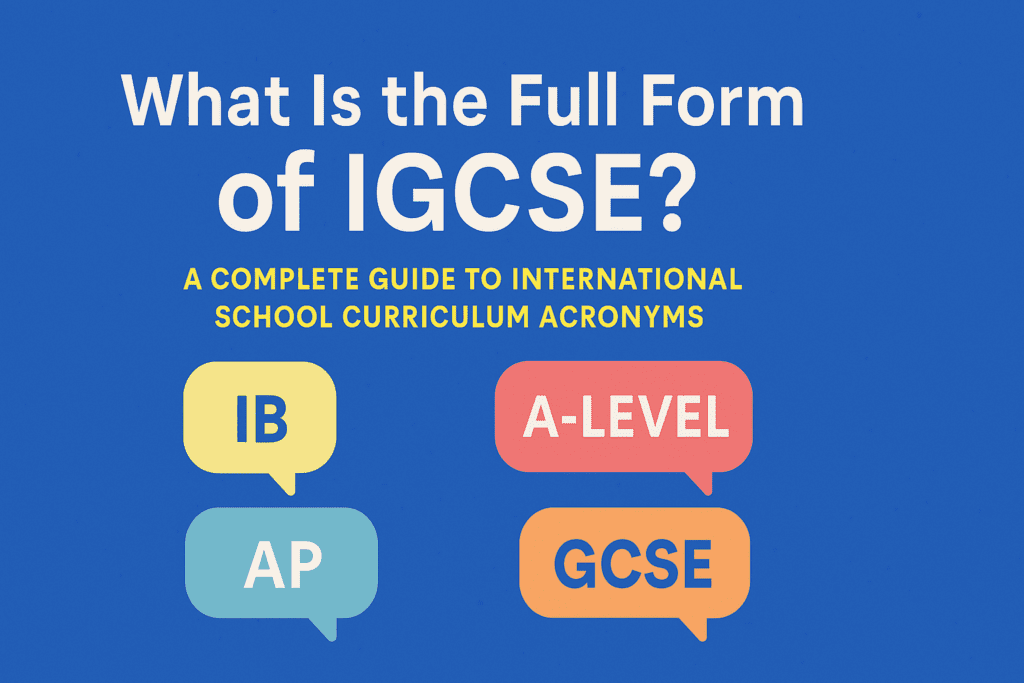Introduction
International school curriculum acronyms like IGCSE, IB, and AP can be confusing for parents and students exploring education options around the world. These terms often come up when researching school systems in the UK, US, and globally affiliated international schools.
Understanding what each of these acronyms means, who they’re for, and how they differ is essential in making the right academic choices.
This guide explains the full forms, meanings, and key features of the most commonly used curriculum abbreviations across the globe. Whether you’re moving abroad, comparing academic pathways, or just need clarity, we’ve got you covered.
What Is the Full Form of IGCSE?
IGCSE stands for International General Certificate of Secondary Education.
Typically taken by students aged 14–16
Administered by Cambridge International and Edexcel
Globally recognized equivalent of the UK’s GCSE
Emphasizes practical knowledge, subject mastery, and international relevance
Usually a 2-year program with exams at the end
What Is the Full Form of IB?
IB stands for International Baccalaureate.
The IB curriculum is divided into three main programmes:
PYP (Primary Years Programme) – for ages 3–12
MYP (Middle Years Programme) – for ages 11–16
DP (Diploma Programme) – for ages 16–19
The IB Diploma Programme (IBDP) is the most widely recognized and is known for:
A holistic approach to education
Six subject groups
Core components like Theory of Knowledge (TOK), Extended Essay (EE), and Creativity, Activity, Service (CAS)
Emphasis on global citizenship and independent research
What Is the Full Form of GCSE?
GCSE stands for General Certificate of Secondary Education.
A UK-based qualification typically taken by students aged 14–16
Prepares students for A-Levels or vocational studies
Subjects include English, Maths, Sciences, Humanities, and more
Marked by end-of-course exams with some coursework in select subjects
IGCSE vs GCSE:
IGCSE is more internationally oriented
GCSE is tailored to the UK national curriculum
Both are academically equivalent
What Is the Full Form of A-Level?
A-Level stands for Advanced Level.
UK qualification for students aged 16–18
Typically follows GCSE or IGCSE
Students usually take 3–4 subjects
Focuses on in-depth knowledge of selected disciplines
Recognized by UK universities and institutions worldwide
What Is the Full Form of AP?
AP stands for Advanced Placement.
A US-based curriculum offering college-level courses to high school students
Developed and managed by the College Board
Students can take AP exams in subjects like Calculus, Biology, Psychology, and History
Widely accepted by universities in the US and abroad for credit or placement
What Is the Full Form of SAT and ACT?
SAT
SAT stands for Scholastic Assessment Test.
Used in US college admissions
Tests reading, writing, and math
Administered by the College Board
ACT
ACT stands for American College Testing.
Another standardized college entrance test in the US
Tests English, Math, Reading, Science, and an optional Writing section
Related Questions & Quick Definitions
Is IGCSE the same as GCSE?
No, but they are equivalent in difficulty and academic level. IGCSE is designed for international use and has a broader range of subjects, while GCSE aligns with the UK national curriculum.
What is the difference between IB and IGCSE?
IB is a full educational framework with core components and a global focus, often pursued from ages 3 to 19.
IGCSE is a subject-based qualification typically taken between ages 14 and 16.
Which curriculum is best for international students?
That depends on the student’s goals:
IB is best for students aiming for global universities.
IGCSE/A-Level suits those targeting UK or Commonwealth universities.
AP is ideal for students heading to US colleges.
What are A-Levels equivalent to?
A-Levels are typically equivalent to the IB Diploma Programme and AP courses in terms of academic level.
All are considered pre-university qualifications.
Is IB harder than AP or A-Level?
IB is often considered more demanding due to its comprehensive curriculum, ongoing assessments, and core components (TOK, EE, CAS). However, difficulty is subjective and varies by learning style.
Can students switch from one curriculum to another?
Yes, but it requires planning. Consult with school counselors when switching from IGCSE to IB or from GCSE to A-Level, etc.
Curriculum Comparison Summary Table
| Acronym | Full Form | Age Group | Region of Use | Exam Type |
|---|---|---|---|---|
| IGCSE | International General Certificate of Secondary Education | 14–16 | Global (UK-based) | Subject-based exams |
| IB | International Baccalaureate | 3–19 (DP: 16–19) | Global | Coursework + exams |
| A-Level | Advanced Level | 16–18 | UK, international schools | Final exams |
| AP | Advanced Placement | 16–18 | US, international schools | Final exams |
| GCSE | General Certificate of Secondary Education | 14–16 | UK | Exams |
| SAT | Scholastic Assessment Test | 16+ | US, global | Standardized test |
| ACT | American College Testing | 16+ | US, global | Standardized test |
Final Thoughts
In a world of rapidly expanding international education, knowing the meaning behind these academic acronyms is key. Whether you’re exploring IB schools in Singapore, IGCSE options in Dubai, or preparing for AP exams in the US, this guide can help you decode the complex world of school curricula.
Need more help deciding? Explore our curriculum comparisons, admissions strategies, and academic planning guides to stay ahead.
Linked resources: ibo.org, cambridgeinternational.org, collegeboard.org





